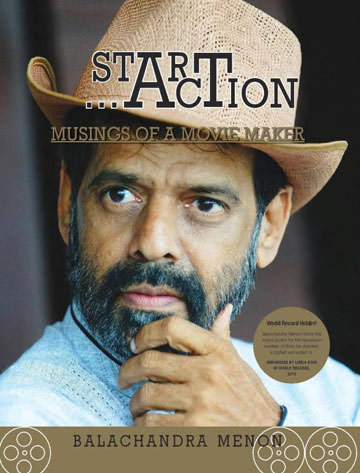When Malayalam film industry revolved around the tickles of soft porn in the early 70s, after the phenomenal success of I.V. Sasi's Avalude Ravukal, came a young director with a new vogue to bring the family back to the theatre. Balachandra Menon was instrumental in building a new cinematic path where the film started revolving around the director instead of the actor.
Menon's Start Action: Musings of a Movie Maker is an autobiographical retrospective of his major films—from Uthradarathri to Njan Samvidhanam Cheyyum. While documenting the steady evolution of a filmmaker—from a person who couldn't even confidently say 'start', 'action' or 'cut' to one of the most celebrated directors of Malayalam—the book is replete with riveting anecdotes. Each chapter is devoted to one film and includes a prologue penned by eminent personalities from various walks of life.
Filmmaking is not a bed of roses. The accounts on his initial movies give us a vast view of the ball and chain he had faced behind the camera—from the 'pooja' to getting the censor board clearance. For a young director in his twenties, the cinema was a real bear where you will fail of success unless you have the passion and vision. Menon had both, and his earlier films are the reflection of the level of his maturity at a very young age. He was not even thirty when he created some of his masterpieces like Radha Enna Penkutti, Kalika and Vaiki Vanna Vasantham.
The memories he shared makes the book an almanac for not only budding directors, but for anybody associated with the art or business of filmmaking. There is hardly a realm which Menon left untouched during his illustrious career—be it director, actor, producer or singer. Himself being a versatile actor, Menon's profound knowledge about the grammar of acting is evident when he elaborates on how he chose the cast, sometimes even overcoming the producer's pique.
No wonder Menon gifted a number of acting talents to the Malayalam industry, including a slew of versatile heroines. And he had interesting tales to narrate on unearthing each of those wunderkinds.
The book is a bundle of anecdotes. It sheds light on the real life persona of many of the famous artists—both dead and alive—who worked with him. The list is long—Venu Nagavalli, Madu, Maniyan Pillai Raju, Sukumari, Ambika, Srividya.
However, the collage is largely a retrospective of Menon's 40 years in cinema—his experiences, friendships, wild thoughts and the multi-faceted challenges in the filmmaking. He seeks to explain the uniqueness of each of his movies, how some of the symbols he used, especially the titles, later turned out to be trend-setters and how a few of his movies are “creation of circumstances”. For him, cinema is a school of hard knocks and he was always ready to take the bad with the good.
The book also includes tales of betrayals and back-stabbing. The egos among artistes and the cold war in film sets find their mentions on various occasions. On his account of Kalika, Menon expounds the sequence of events which led to the Nana weekly, where he started his career as a reporter, “blacklisting” him as a director. He also touches upon the gossips and rumours that ruled the industry from time to time—be it the romance between Jagathy Sreekumar and Mallika or the love story of Sreenath and Shanthikrishna.
The book offers a smooth read, devoid of any jargon. Menon has shown utmost care in documenting all that he can remember about each of his films. This will be the first time an integral book on Malayalam films is released in English aiming at international readers.
Some may find that his writings lose focus at times; others may feel the tone is exaggerated—he himself has said his mind is undisciplined—but the frankness of the content will make up for both of them.
Book: Start Action - Musings of a filmmaker
Author: Balachandra Menon
Publisher: Konark Publishers
Price: Rs 1999
Pages: 499
[Menon has created the record of being Number 1 in the world, as declared by Limca Book of Records, by directing the maximum number of films based on his own script and acting in it.]


